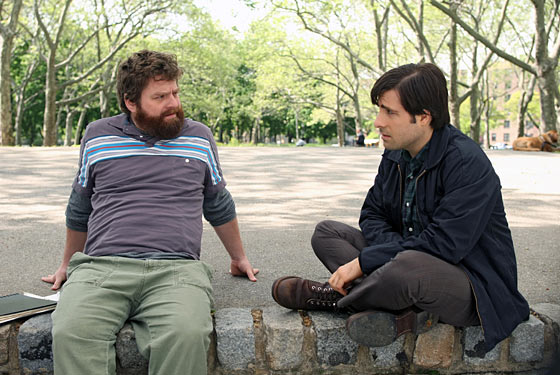
This week, the sloppy detective sets up shop in Fort Greene Park, where he meets client No. 4: a smarmy Russian named Dimitri who is seeking his cabaret-singer lover in Little Odessa (a.k.a Brighton Beach). Bi-curious George, meanwhile, seeks his feminine side as part of an elaborate, desperate appeal to the magazine’s dwindling female readership. On a scouting mission to the Russian club where Irina the Lonely Dove is said to perform, Jonathan is welcomed with open arms and wide-open bottles of Stoli. The drunken revelry inspires him to give his own unrequited lover the Brighton Beach date she always wanted but he never gave her. Jonathan invites Ray (who, in turn, invites his unwitting girlfriend) along for a double date at Club Tatiana. All goes swimmingly until Jonathan’s detective duty and his editor call, both of which lead him to a brutal beating by Tatiana’s thugish regulars. The good news: Jonathan has located his target. The bad news: It is at the expense of reconciliation with Suzanne, as well as Ray’s chances at getting laid. More bad news: The singing Dove is a harbinger of war, not peace. She says Dimitri is the reason her brother is in jail and sics the Russkie goons on him. But all ends well for Jonathan, George, and George’s gay escort as they giddily pile onto George’s couch for a viewing of Russian detective caper movie The Inspector General (starring the ambiguously gay Danny Kaye). It’s a nice bow-tie ending to the episode, but how carefully knotted are the New York references?
Nostrovia!
• Brighton Beach may be the obvious setting for a Russian story, but it’s also on the short list of Places a New Yorker Must See Before He/She Dies (and/or skips town). Plus one.
• Maybe The Inspector General is a little too perfect of a pop-culture reference, but the real Jonathan Ames and his friends surely adore it. Plus one.
• Tatiana, the supper club, is not only an appropriate setting, but it’s actually a real-life place the real-life Jonathan Ames once took a date (read about it here). Plus two.
• The expressionless Russian bartender pours Jonathan a glass of Stoli when he asks for white wine. We can see this. Plus two.
• Ray’s latest cartoon illustration is a hero with a gigantic phallus, which he says is exactly what his Esquire editor wants — George regrets losing his magazine’s female readers, but Esquire keeps it butch. Plus one.
Nyet! Nyet! Nyet!
• Bored to Death thrives on stereotypes, but having Jonathan discuss Dostoevsky with the Russian client is just plain lazy. Maybe try Bulgakov next time? Minus one.
• Yes, print journalism is in its death throes. Yes, McKinsey is swinging its axe all over Condé Nast (the ostensible publisher of George’s Vanity Fair–esque magazine). But going gay-ish for the sake of readers seems a lot more like something a TV character, rather than a real-life editor, would actually do. Bonus point for the “It helped Jann Wenner’s career!” line, though. Minus one.
• Ray has totally gone castrato in the face of his overbearing girlfriend’s unrealistic demands. Everyone knows that there are plenty more female fish in the New York sea. Minus one.
• At the end, the Russian client, who had a near-death experience because of Jonathan’s sloppy sleuthing, doesn’t go ballistic on him. Instead, he delivers a Shakespearean prophecy about how a broken heart is a sign of a life full of love. Minus 3.
• When Jonathan’s ex takes his call, she is obviously walking along the perimeter of the same park that he’s in. New York may at times feel like a small town, but this is pushing it. Minus 1.
Neat-and-tidy endings beget neat-and-tidy reality-matrix scores: It’s a tie. And, all in all, it was more digestible than most Russian novels. If he were around today, Tolstoy would probably approve of the tragic ending to Dimitri’s love story — and maybe he’d even write a nail-biter tale of a desperate editor who throws his sexual identity on the tracks for the greater good of the magazine business.

